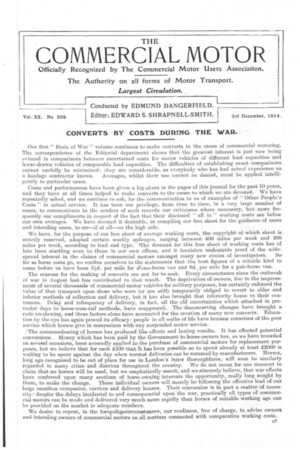CONVERTS BY COSTS DURING THE WAR.
Page 1

If you've noticed an error in this article please click here to report it so we can fix it.
Our first" State of War" volume continues to make converts to the, cause of commercial motoring. The correspondence of the Editorial department shows that the greatest interest is just now being evinced in comparisons between ascertained costs for motor vehicles of different load capacities and horse-drawn vehicles of comparable load capacities. The difficulties of establishing exact comparisons cannot usefully be minimized: they are considerable, as everybody who has had actual experience as a haulage contractor knows. Averages, whilst their use cannot be denied, must be applied intelligently to particular cases.
Costs and performances have been given a big -share in the pages of this journal for the past 10 years, and they have at all times helped to make converts to the cause to. which we are devoted. We have .repeatedly asked, and we continue to ask, for the communication to us of examples of " Other People's Costs" in actual service. It has been our privilege, from time to time, in a very large number of cases, to communicate to the senders of such records our criticisms where necessary, but more frequently our compliments in respect of the fact that their disclosed " all in " working costs are below our own averages. We have deemed it desirable, in compiling our free sheet for the guidance of users and intending users, to err—if at all—on the high side.
We have, for the purpose of our free sheet of average working costs, the copyright • of which sheet is strictly reserved, adopted certain weekly mileages, ranging between 400 miles per week and 200 miles per week, according to load and type.-4The demand for this free sheet of working casts has of late been startling even to those in our Own offices, and it furnishes undeniable proof of the widespread interest in the claims of commercial motors amongst many new circles of investigators. So far as horse costs go, we confine ourselves to the statements that the best figures of a reliable kind to come before us have been 5A. per mile for atone-horse van and Ad. per mile for a pair-horse van.
The reasons for the making of converts are not far to seek. Every circumstance since the outbreak of war in August last has contributed to that result. The deprivation of owners, due to the impressment of several thousands of commercial-motor vehicles for military purposes, has certainly enforced the value of that transport upon those who were (or are still) temporarily obliged to revert to older and inferior methods of collection and delivery, but it has also brought. that inferiority home to their customers. Delay and infrequency of delivery, in fact, all the old uncertainties which attached in premotor days to horse-cum-rail methods, have reappeared. The disconcerting changes have brought a rude awakening, and these factors alone have accounted for the creation of many new converts. Education by theeye has again proved its efficacy: people in all walks of life have become conscious of the poor service which horses give in comparison with-any suspended motor service.
:The commandeering of horses has produced like effects and lasting results. It has effected potential conversions. Money which has been paid by the Government to horse-owners has, as we have recorded on sevemil occasions, been avowedly applied to the purchase of commercial motors for replacement purposes, but we believe that for each £100 thatit has been possible so to spend already at least /2000 is waiting to be spent against the day when normal deliveries can be resumed by manufacturers. Horses, long ago recognized to he out of place for use in London's inner thoroughfares, will soon be similarly regarded in many cities and districts throughout the country. We do not mean for one moment to claim that no horses will be used, but we emphatically assert, and we sincerely believe, that war effects have conferred upon many sections of horse-owning interests the opportunity, really long sought by them, to make the change. These individual owners will merely be following the effective lead of our large omnibus companies, carriers and delivery houses. Their conversion is in part a matter of necessity: despite the delays incidental to and consequential upon the war, practically all types of commercial motors can be modeand delivered very much more rapidly than horses of suitable working age can be provided on the market in adequate numbers.
We desire to repeat, in the foregorivecircumetances, our readiness, free of charge, to advise owners and intending owners of commercial motors on all matters connected with comparative working costa. c7




















